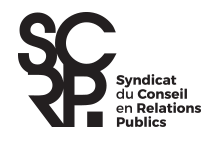Quality and Professional Code of Ethics

Quality accreditation of public relations agencies
The Consultancy Management Standard – or CMS – is the hallmark of performance and communication excellence. Accreditation helps agencies to meet international organisation standards and requirements for all aspects of public relations consulting.
Introduced in the United Kingdom in 1997, CMS is now an internationally recognised accreditation used in more than 15 countries, including Italy, Poland and Switzerland. Some countries have so far as to make it mandatory. The process is simple and quick and provides clients with an assurance of quality as well as an essential PR agency selection criterion. All CMS-accredited agencies are organised to ensure that teams are consistently effective throughout their engagement for the client.
To guarantee the efficiency of CMS accreditation in France, audits are conducted by audit firm DNV, under a partnership agreement with Syntec Conseil en Relations Publics. DNV is a Norwegian company with a long history of identifying, anticipating and managing risks dating back to 1864. Initially operating in the marine insurance business, it has broadened its expertise to transport, IT, health, energy, defence, agri-foods, finance, automotive and public services. DNV is present in more than 100 countries and employs 7,400 people representing 85 different nationalities. DNV offers the full range of current certification services.
· How do you obtain agency accreditation?
· What is the scope of accreditation?
· How much time is involved and how much will CMS accreditation cost?
Click here to download the terms and conditions for QUALITY accreditation certification audited by DNV

To date, five agencies in France are CMS III-accredited:
· WELLCOM
· VP STRAT & COM
· BURSON-MARSTELLER I&E
· OGILVY PR
· KINGCOM
Professional Code of Ethics for public relations agencies
Member companies of Syntec Conseil en Relations Publics are committed to upholding and promoting the ethical principles and professional standards in effect in France and other countries in the codes of ethics and charters listed below, starting with the association’s Professional Code of Ethics.
Professional code of ethics in crisis communication (published in 2014)
The principles in this charter provide guidance for professionals in crisis communication.
Syntec Conseil en Relations Publics Professional Code of Ethics (published in 1998 and updated in 2013)
In 2013, Syntec RP updated its Professional Code of Ethics for public relations in France, which combines the principles of the relevant international ethics codes. All members undertake to uphold and promote the Code when they join the association.
Lobbying consulting professional charter (published in 1991)
The Association Française des Conseils en Lobbying et Affaires Publiques (AFCL – French association of lobbying and public affairs consultants) published this charter in 1991.
Lobbying consulting represents the interests and defends the rights of companies, associations or local authorities by sharing rigorous, verifiable and reciprocal information with private or public organisations that make decisions that could affect these interests or rights.
Belle Compétition Charter (published in 2014)
The tender process is a very important stage in relations between a company and an agency. Regardless of their specialty area, tenders require a major investment in time, financial ressources, ideas and expertise from both parties. La Belle Compétition charter is a tool to use to ensure that calls for tender are “great competitions”. The charter sets out criteria that apply to all aspects of communications consulting to help agencies and clients demonstrate their commitment to transparency, responsibility and fairness throughout the tender process.
International Public Relations Association Code of Conduct (published in 2010)
Syntec RP fully supports the initiative of the International Public Relations Association (IPRA), the first global association of public relations practitioners, and has adopted its 2010 Code of Conduct to provide a framework for the ethical and socially responsible practice of the profession around the world.
International Communications Consultancy Organisation’s Stockholm Charter (published in 2003)
All assocations affiliated with the International Communications Consultancy Organisation (ICCO) comply with the Stockholm Charter. This document was adopted in 2003 to replace the Rome Charter, originally adopted by the ICCO in 1986. The Stockholm Charter sets out a code of professional conduct and standards that help to define the industry.
Code of Lisbon (published in 1978)
The Code of Lisbon was first adopted during the General Assembly of CERP, the European Public Relations Confederation, in Lisbon in 1978. It sets the criteria and standards of qualification and the professional obligations of PR practitioners.
Code of Athens (published in 1965)
Adopted in 1965 and amended in 1968 and 2009 by the International Public Relations Association (IPRA), the Code of Athens states the ethical rules for PR professionals.







